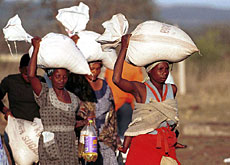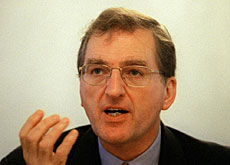Earth summit ends with global action plan

World leaders have unveiled a global action plan on the last day of the Earth summit in Johannesburg.
The fact that an agreement was reached at all was welcomed by NGOs, but they said it lacked binding commitments to reduce poverty and conserve the Earth’s resources.
The plan – which was adopted by heads of state and government at the summit’s closing ceremony on Wednesday – covers a broad range of issues, including water and sanitation, energy and biodiversity.
Governments agreed to a deadline of 2015 to reduce by half the number of people without access to proper sanitation, but failed to reach consensus on a timetabled commitment to increase the use of renewable energy.
“We pledge to implement a global sustainable development programme that gives absolute priority to bridging the deep fault lines that divide human society into rich and poor,” reads the opening page of a political declaration which will accompany the 71-page action plan.
Reaching consensus
The Swiss foreign minister, Joseph Deiss, welcomed the outcome of the summit, but also acknowledged the difficulty of reaching multilateral consensus.
“The role of this summit was to have a common global strategy and put forward a certain number of global problems,” Deiss told swissinfo.
“The difficulty of summits like this is that we need unanimity and not just the support of a majority of countries,” he added.
Environmental groups have accused many countries – including the United States – of failing to take responsibility for those issues which they say will shape the future of the world.
Claude Martin, director general of the Swiss-based environmental group, WWF,
said the summit had failed to address the “root causes of poverty and lack of sustainable development”.
But he told swissinfo there had nevertheless been progress in the area of cooperation. “The end result was not what we would have expected… but it emphasised the potential of groups of countries which are like-minded and more forward-looking than others.”
He also praised Switzerland for its efforts. “We are quite happy with the role Switzerland has played… The size of country doesn’t necessarily determine whether you can be an effective broker. It’s the skill of the negotiators.”
Missing the target?
Martin said his organisation’s biggest regret was the absence of key timetables and targets in the action plan.
“These have dropped out because they wanted to reach an agreement, so in the end we have a paper which is not worth much … and at most only reconfirms previous accords,” he said.
Philippe Roch, director of the Swiss Environment Agency and a member of the Swiss negotiating team, said he was “already disappointed before the summit started”.
“Nonetheless, I think it was necessary to have this summit because of the loss of interest in the issue of sustainable development at the highest political level,” said Roch.
“That’s why this has been useful … but here in Johannesburg there are only beginnings and no conclusions.”
Praise for Swiss
The Swiss delegation has declared itself “satisfied if not euphoric” with the outcome of the summit.
Martin praised Switzerland for working at the negotiating table to try to resolve differences between international delegations.
“We are happy with the role that Switzerland has played here, and it is clear that the size of the country does not necessarily determine whether you can be an effective broker,” he said.
“Switzerland played a very positive role, for example, when it came to the issue of energy,” he added.
“It always adopted a proactive stance on energy questions, and I think their negotiators have done a good job.”
Legacy of Johannesburg
As the biggest ever global conference of its kind draws to a close, questions are being asked by both governments and civil society groups about what legacy the summit will leave behind.
“Johannesburg will be best remembered for the shameful behaviour of some governments,” commented Martin.
“But at the same time it will also be remembered for the emergence of a multiplicity and rich diversity of public-private partnerships, which probably show the way ahead.”
Switzerland – which for the past ten days has been hosting a sustainable development information platform on the sidelines of the summit – on Monday launched a partnership initiative of its own.
The mountain partnership programme is an attempt to create an informal alliance of Alpine countries, private sector and non-governmental organisations which share an interest in the concept of sustainable development in the mountains.
swissinfo, Ramsey Zarifeh, Johannesburg
Agreement was reached to halve the number of people who lack access to proper sanitation from two billion to one billion by 2015.
The text calls on governments to significantly reduce the loss of biodiversity by 2010.
States which have not yet ratified the Kyoto Protocol are urged in the text to do so “in a timely manner”.
Governments have agreed to increase the use of renewable energy – but on the insistence of the United States, no deadlines have been set.

In compliance with the JTI standards
More: SWI swissinfo.ch certified by the Journalism Trust Initiative

You can find an overview of ongoing debates with our journalists here . Please join us!
If you want to start a conversation about a topic raised in this article or want to report factual errors, email us at english@swissinfo.ch.